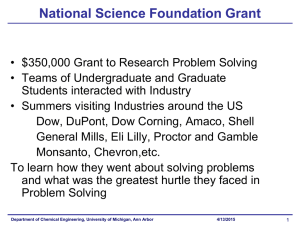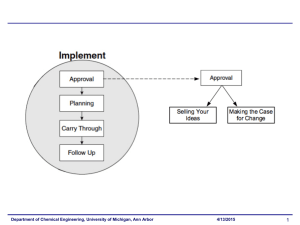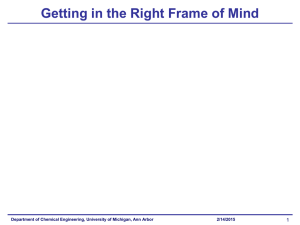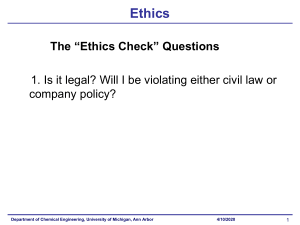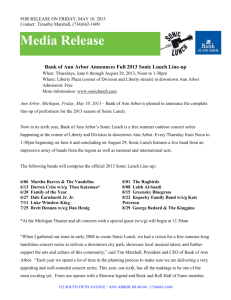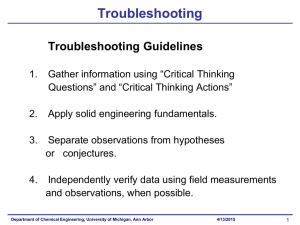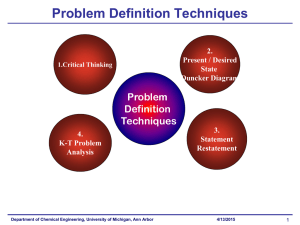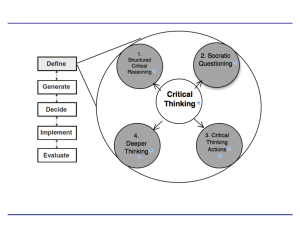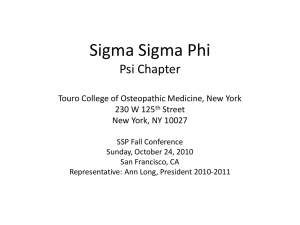Chapter 6 - Mental Blocks
advertisement
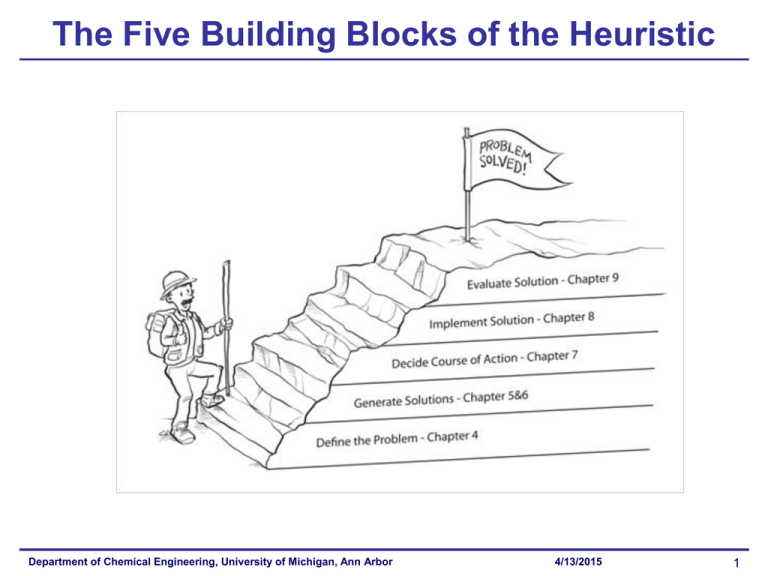
The Five Building Blocks of the Heuristic Department of Chemical Engineering, University of Michigan, Ann Arbor 4/13/2015 1 Chapter 6 Breaking Down Barriers to Generating Solutions Causes of Mental Blocks Department of Chemical Engineering, University of Michigan, Ann Arbor 4/13/2015 2 Common Causes of Mental Blocks • Defining the problem too narrowly. • Assuming there is only one right answer. Department of Chemical Engineering, University of Michigan, Ann Arbor 4/13/2015 3 Common Causes of Mental Blocks • Being distracted by irrelevant information, called “mental dazzle”. • Getting frustrated by lack of success. • Being too anxious to finish. Department of Chemical Engineering, University of Michigan, Ann Arbor 4/13/2015 4 Common Causes of Mental Blocks • Getting “hooked” on the first solution that comes to mind. • Getting “hooked” on a solution that almost works (but really doesn’t). • Defining the problem too narrowly. • Assuming there is only one right answer. • Being distracted by irrelevant information, called “mental dazzle”. • Getting frustrated by lack of success. • Being too anxious to finish. Department of Chemical Engineering, University of Michigan, Ann Arbor 4/13/2015 5 Common Causes of Mental Blocks • Getting “hooked” on the first solution that comes to mind. • Getting “hooked” on a solution that almost works (but really doesn’t). Department of Chemical Engineering, University of Michigan, Ann Arbor 4/13/2015 6 Recognizing Mental Blocks Adams’ 6 Types of Conceptual Blocks A. Perceptual Blocks • Limiting the problem unnecessarily (9 Dots) • Stereotyping (Flashlight in Desert) • Saturation or information overload (Air Traffic Controllers) Department of Chemical Engineering, University of Michigan, Ann Arbor 4/13/2015 7 Recognizing Mental Blocks B. Emotional Blocks • Fear of risk taking (Number one Inhibitor) • Lack of appetite for chaos (Must learn to live with confusion) • Judging rather than generating ideas (Wild ideas) • Inability to incubate Department of Chemical Engineering, University of Michigan, Ann Arbor 4/13/2015 8 Recognizing Mental Blocks C. Cultural Blocks (Taboos) D. Environmental Blocks (Distractions) Department of Chemical Engineering, University of Michigan, Ann Arbor 4/13/2015 9 Recognizing Mental Blocks E. Intellectual Blocks (Don’t have background knowledge) F. Expressive Blocks (Can’t communicate easily with others) Department of Chemical Engineering, University of Michigan, Ann Arbor 4/13/2015 10 Goman’s Blockbusters Block Blockbuster 1. Negative Attitude Focusing attention on negative aspects of the problem or possible unsatisfactory outcomes hampers creativity. 1. Attitude Adjustment List the positive outcomes and aspects of the problem. Realize that with every problem there is not only danger of failure but an opportunity for success. 2. Fear of Failure One of the greatest inhibitors to creativity is the fear of failure and the inability to take a risk. 2. Risk Taking Outline what the risk is, why it is important, what is the worst possible outcome and, what your options are with the worst possible outcome and how you would deal with this failure. 3. Following the Rules Some rules are necessary, such as stopping at a red light, while others hinder innovation. 3. Breaking the Rules Practice trying new things. Take a different route to work, try a new food, go somewhere you’ve never gone. 4. Over-reliance on Logic A need to proceed in a step-by-step fashion may unfortunately relegate imagination to the background 4. Internal Creative Climate Turn the situation over to your imagination, your feelings, your sense of humor. Play with insights and possibilities. 5. You Aren’t Creative Believing that you are not creative is a serious hindrance to generating creative solutions. Believing that you can’t do something is a selffulfilling prophesy. 5. Creative Beliefs Encourage your creativity, by asking “what-if” questions; daydream, make up metaphors and analogies. Try different ways of expressing your creativity. Department of Chemical Engineering, University of Michigan, Ann Arbor 4/13/2015 11 Creative Thinking Creative Thinking The process we use to develop ideas that are unique, useful and worthy of further elaboration. How can you become more creative? Department of Chemical Engineering, University of Michigan, Ann Arbor 4/13/2015 12 Improving Your Creative Abilities Keep track of your ideas at all times. Many times ideas come at unexpected times. If an idea is not written down within 24 hours it will usually be forgotten. Pose new questions to yourself every day. An inquiring mind is a creatively active one that enlarges its area of awareness. Keep abreast of your field. Read the magazines, trade journals, and other literature in your field to make sure you are not using yesterday's technology to solve toady's problems. Department of Chemical Engineering, University of Michigan, Ann Arbor 4/13/2015 13 Improving Your Creative Abilities Engage in creative hobbies. Hobbies can also help you relax. An active mind is necessary for creative growth. Have Courage and Self-confidence. Be a paradigm pioneer. Assume that you can and will indeed solve the problem. Persist and have the tenacity to overcome obstacles that block the solution pathway. Learn to know and understand yourself. Deepen your self-knowledge by learning your strengths, skills, weaknesses, dislike, biases, expectations, fears and prejudices. Department of Chemical Engineering, University of Michigan, Ann Arbor 4/13/2015 14 Improving Your Creative Abilities Learn about things outside your specialty. Use cross-fertilization to bring ideas and concepts from one field or specialty to another . Avoid rigid, set patterns of doing things. Overcome biases and preconceived notions by looking at the problem from a fresh view point, always developing at least two or more alternative solutions to your problem. Be open and receptive to ideas (yours and others). New ideas are fragile; keep them from breaking by seizing on the tentative, half formed concepts and possibilities and developing them . Department of Chemical Engineering, University of Michigan, Ann Arbor 4/13/2015 15 Improving Your Creative Abilities Be alert in your observations. Look for similarities, differences, as well as unique and distinguishing characteristics in situations and problems. Keep your sense of humor. You are more creative when you are relaxed. Humor aids in putting your problems (and yourself) in perspective. Many times it relieves tension and makes you feel more relaxed. Adopt a risk taking attitude. Fear of failure is the major impediment to generating solutions which are risky (i.e. small chance of succeeding) but would have a major impact if they are successful. Department of Chemical Engineering, University of Michigan, Ann Arbor 4/13/2015 16 Improving Your Creative Abilities Adopt a risk taking attitude. Fear of failure is the major impediment to generating solutions which are risky (i.e. small chance of succeeding) but would have a major impact if they are successful. Department of Chemical Engineering, University of Michigan, Ann Arbor 4/13/2015 17 Risk Taking Risks are actions with little chance of succeeding that require significant effort, resources, and/or time. However, if they are successful, they will have a significant impact. Truly innovative solutions that make a significant difference in your life, organization, and/or community are almost never found without some risk taking. Any time you take a risk, there will most likely be someone out there to criticize it. Don’t be too sensitive to criticism. Department of Chemical Engineering, University of Michigan, Ann Arbor 4/13/2015 18 Risk Taking - Xerox In 1959 Xerox completed the first prototype copier and initiated work to go into mass production. They found that producing high quality machines was going to require a great deal of investment. Consequently they hired Arthur D. Little to carry out a marketing and financial analysis. The analysis concluded that no more than 500 units would sell, which may not justify such a large capital investment. The project looked like it would end before it began. Department of Chemical Engineering, University of Michigan, Ann Arbor 4/13/2015 19 Risk Taking - Xerox Fortunately, management went ahead with the risk and took on the project. Ten years later Xerox passed the billion dollar ($1,000,000,000.00) mark as a result of their revolutionary office copiers. Smith, Douglas K. and Robert C. Alexander, Fumbling the Future, William Morrow and Company, Inc., New York: 1988. Department of Chemical Engineering, University of Michigan, Ann Arbor 4/13/2015 20 Risk Taking – Xerox Alto In 1973, a company developed the Alto System which included the: •First Personal Computer •First Hand-Held Mouse •First Word Processing System For Non-experts Department of Chemical Engineering, University of Michigan, Ann Arbor 4/13/2015 21 Risk Taking – Xerox Alto A survey showed there was not a market for personal computers (PCs). In 1979 they decided not to take the risk and as a result did not market the Alto. Epilogue Xerox was the first to develop the PC, yet it still remains a copy company to many people, while revenues from Apple and IBM measured in the billions of dollars by 1981. . Smith, Douglas K. and Robert C. Alexander, Fumbling the Future, William Morrow and Company, Inc., New York: 1988. Department of Chemical Engineering, University of Michigan, Ann Arbor 4/13/2015 22 Failure in INDONESIA A major marketing campaign was initiated to introduce Coca-Cola into Indonesia. Department of Chemical Engineering, University of Michigan, Ann Arbor 4/13/2015 23 Failure: Coca Cola in Indonesia A major marketing campaign was begun to introduce Coca-Cola to Indonesia. Indonesians tried Coca Cola and did not like it. Sales dropped off rapidly. sales time Coca-Cola FAILED!!! But did they QUIT?? Department of Chemical Engineering, University of Michigan, Ann Arbor 4/13/2015 24 But did they quit? Indonesians were used to tea, coffee, and tropical soft drinks and were unaccustomed to carbonated drinks. Coca-Cola phased in carbonation by introducing it into strawberry, pineapple, and banana flavored soft drinks. The sale of Coca-Cola now surpasses the sale of local tropical drinks. Mattimore, Bryan W. 99% inspiration, Amacom, USA: 1994. p. 29. Department of Chemical Engineering, University of Michigan, Ann Arbor 4/13/2015 25 Failure U. of Michigan Business School: Failure 101 Course Student Projects • Market Reversible Diapers • Open a Maternity Ward in a Retirement Center Department of Chemical Engineering, University of Michigan, Ann Arbor 4/13/2015 26 Failure U. of Michigan Business School: Failure 101 Course • Tom • Warren • Don Department of Chemical Engineering, University of Michigan, Ann Arbor 4/13/2015 27 Failure U. of Michigan Business School: Failure 101 Course • Domino’s™ Pizza • Avis Rental Car • 3M Post-it™ Notes Department of Chemical Engineering, University of Michigan, Ann Arbor 4/13/2015 28 “Failure” •John Grisham, two publishers turned down his first novel. •Henry Ford went bankrupt five times •Vincent Van Gogh sold only one painting in his lifetime •Michael Jordon failed to make his high school varsity team in his sophomore year. •The Jonas Brothers were dropped by their recording company after first CD failed. “Failure” •Oprah failed as a news reporter •Winston Churchill failed the entrance exam for the Royal Military College at Sandhurst three times before finally passing and being allowed to attend. •Orville Wright of the Wright brothers was expelled from school. “Failure” •Henry Ford went bankrupt five times •Vincent Van Gogh sold only one painting in his lifetime •Michael Jordon failed to make his high school varsity team in his sophomore year. •Winston Churchill failed the entrance exam for the Royal Military College at Sandhurst three times before finally passing and being allowed to attend. •The Jonas Brothers were dropped by their recording company after first CD failed. “Failure” •J.K. Rowling (Harry Potter) hit rock bottom and was virtually penniless, divorced, single mother, and jobless seven years after graduation. It is impossible to live without failure at something unless you live so cautiously that it is impossible to fail, in which case you failed by default. -J.K. Rowling Embrace Failure! Failure • Fear of failure is the greatest inhibitor to risk taking. • If major breakthroughs are to be made, risks will have to be taken. • Failures resulting from these risks will occur, but are only events on the learning curve Ideal Learning Curve Actual Learning Curve success success 5 2 1 time 4 3 time Points 1, 2, 3, 4, and 5 are not failures, but rather events. The knowledge gained from these events should be used constructively so that the chances of success will be greater on the next try. Department of Chemical Engineering, University of Michigan, Ann Arbor 4/13/2015 33 Failure There is no such thing as failure unless you do not learn from an event (‘failure”) on the learning curve!! Department of Chemical Engineering, University of Michigan, Ann Arbor 4/13/2015 34 Failure U. of Michigan Failure 101 Course Domino’s™ Pizza Avis Rental Car 3M Post-it™ Notes The Greatest Inhibition To Risk Taking… is fear of failure Department of Chemical Engineering, University of Michigan, Ann Arbor 4/13/2015 35 Overcoming the Fear of Failure • Outline : What The Risk Is Why The Risk Is Important • Describe : The Worst Possible Outcome • Describe : What Are Your Options Given The Worst Possible Outcome • Describe : What You Could Learn To Start Again Given The Worst Possible Outcome Department of Chemical Engineering, University of Michigan, Ann Arbor 4/13/2015 36 Taking Risks Some simple things you can do that will make you become more comfortable with risk-taking: Department of Chemical Engineering, University of Michigan, Ann Arbor 4/13/2015 37 Risk Taking Simple things you can do to make you a more comfortable risk-taker: • Challenge established patterns of doing business within your organization • Try a new sport (e.g. skydiving) • Join a thespian group • Volunteer to be the organizer of a group activity • Volunteer to speak at a conference or meeting • Buy an expensive item that can only be used once you attain a goal (i.e. a dress one size too small, a heavier weight set) • Sing at a Karaoke bar Department of Chemical Engineering, University of Michigan, Ann Arbor 4/13/2015 38 Risk Taking Summary •To make a breakthrough you have got to be willing to make mistakes •Make as many mistakes as you need to learn •“Failure” is a strengthening process Department of Chemical Engineering, University of Michigan, Ann Arbor 4/13/2015 39 Risk Taking Summary •Success is going from “Failure to Failure” with great enthusiasm •Make Failure Respectable •There is no sure thing as “failure,” a bad result is only an event on the learning curve - UNLESS you do not learn from the event Menlo Industries Sign on the Wall: Make Mistakes Faster Department of Chemical Engineering, University of Michigan, Ann Arbor 4/13/2015 40 Risk Taking Summary •To make a breakthrough you have to be willing to make mistakes •Make as many mistakes as you need to learn •“Failure” is a strengthening process •Success is going from “Failure to Failure” with great enthusiasm •Make Failure Respectable •There is no sure thing as “failure,” it is only an event on the learning curve - UNLESS you do not learn from the event •Practice some form of risk taking everyday Department of Chemical Engineering, University of Michigan, Ann Arbor 4/13/2015 41
